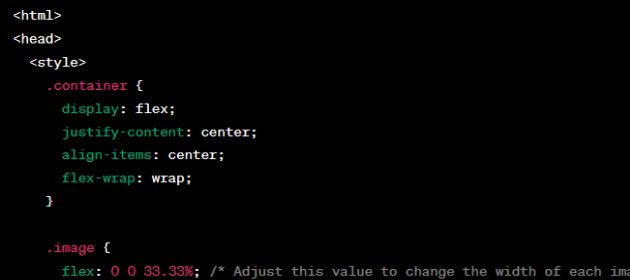While building the new website of my company, I asked ChatGPT for code for the following responsive design elements:
- 3 images side by side
- Table with 2 rows, first row with 3 images, second row with 3 links
- 3 images side by side on one line and 3 links on the next line
- 3 images side by side with linked captions.
ChatGPT responded back with code snippets for all four specs. One of them is shown partially in the following exhibit.
All code snippets worked first time. I didn’t need to do any debugging (not that I’m capable of doing any!).
I had a doubt about the following line in the code supplied by ChatGPT:
———-
.image {flex: 0 0 33.33%; /* Adjust this value to change the width of each image */ max-width: 100%;
———-
I asked ChatGPT for clarification.
It gave me a crystal clear reply without any of the mocking / patronizing attitude of the typical StackOverflow user.
By any benchmark, ChatGPT’s performance was superlative.
This raises the following question:
Will ChatGPT kill coders?
———-
This is not the first time people have asked this question.
In the past two decades or so, many technologies that were as revolutionary at the time as ChatGPT is today were predicted to render coders obsolete. Let me go down memory lane and recount some of them.
1. ERP
Back in the day, companies developed their own software. These were typically custom-developed point solutions for sales, purchase, inventory, finance, production, and other functions of a business. They were developed either by a team of inhouse programmers or outsourced to external vendors.
When ERP entered the scene and replaced these custom-developed solutions, people started wondering what would happen to those internal and external coders.
2. RAD / Low Code / No Code Platform
Around this time, I was heading marketing for a global ERP vendor.
Internet was around, my company had a website, and all of us had business email accounts. All marketing collateral was hosted on the website and sales reps could search and download whatever they needed. Oh I’m just joking! The last sentence is not true. I had no idea how to publish my new content on the company website, so I sent it out as email attachments to the field.
One day, I met a coworker in the SMOKING ZONE of my office building. He was a programmer in the engineering org. Lacking any connection at work, I’d never met him at the office. We started exchanging notes about our respective jobs.
I happened to mention to him about my wish to build a portal for hosting marketing collateral. He told me that he’d heard about a tool called Microsoft Frontpage that enabled non-geeks to build simple websites by using a visual editor and drag-and-drop controls. As a power user of Microsoft Visio charting tool, I was familiar with this paradigm.
I went back to my office and tried Frontpage. Lo and behold, I was able to create my marketing collateral portal within a week without writing a single line of HTML code (which I anyway was not capable of).
At the time, Frontpage went by Rapid Application Development (RAD) platform. Today, it would be called low code / no code platform.
Going by this experience, I started wondering about the fate of coders.
3. Code Translators
In my next company, I used to sell a tool that would covert legacy COBOL code to Java. At the time, we used to call it Code Translator. I believe this product category is now renamed as Code Transpiler.
With code transpilers not only being able to translate code from one programming language to another but also clean it up compared to the original, the technology naturally raises questions about the need for coders – and architects and designers – going forward.
4. Workflow Automation
Over time, I’ve used workflow automation tools like IFTTT to automate many workflows e.g.
- As soon as I publish a post on the company blog, automatically post a link on Twitter.
- Whenever somebody engages with my tweet, automatically add them to a list called
skr-engagers.
Again the question arose of whether these workflow automation tools would kill coders?
5. Monitoring + Observability
By automating the end-to-end process of detection, triaging and resolution of incidents in IT landscapes, monitoring and observability platforms create doubts about the need for system administrators in future.
6. WordPress + Gutenberg
I recently used WordPress + Gutenberg Block Editor to upgrade my company website to responsive design. I did not write / edit a single line of code. Who needs coders, huh?
———-
I call the aforementioned technologies DEMAND SUPPRESSORS. All of them were revolutionary when they entered the market and threatened to take away the job of programmers.
But none of them did. If anything, there are more coders now than ever before in the history of IT.
What gives?
I attribute this apparent paradox to the emergence of what I call DEMAND STIMULANTS. Comprising a bunch of new deployment models and usage scenarios, they created new coding jobs in hitherto unfathomed areas of computing.
More on this in a follow-on post. Watch this space.
- SEO Powered Content & PR Distribution. Get Amplified Today.
- PlatoData.Network Vertical Generative Ai. Empower Yourself. Access Here.
- PlatoAiStream. Web3 Intelligence. Knowledge Amplified. Access Here.
- PlatoESG. Carbon, CleanTech, Energy, Environment, Solar, Waste Management. Access Here.
- PlatoHealth. Biotech and Clinical Trials Intelligence. Access Here.
- Source: https://www.finextra.com/blogposting/25317/will-chatgpt-kill-coders?utm_medium=rssfinextra&utm_source=finextrablogs
- :is
- :not
- $UP
- 33
- a
- Able
- About
- Accounts
- add
- administrators
- All
- also
- and
- Another
- any
- anything
- apparent
- Application
- Application Development
- architects
- ARE
- areas
- around
- AS
- At
- attitude
- automate
- automatically
- automating
- Automation
- away
- back
- BE
- before
- being
- believe
- Benchmark
- Block
- Blog
- build
- Building
- Bunch
- business
- but
- by
- call
- called
- capable
- captions
- Category
- change
- charting
- ChatGPT
- clean
- clear
- COBOL
- code
- Coding
- Collateral
- Companies
- company
- compared
- comprising
- computing
- connection
- content
- controls
- could
- create
- created
- Crystal
- day
- decades
- deployment
- Design
- designers
- Detection
- developed
- Development
- DID
- didn
- do
- doing
- doubt
- doubts
- down
- download
- e
- each
- editor
- either
- elements
- emergence
- enabled
- end-to-end
- engages
- Engineering
- entered
- ERP
- EVER
- exchanging
- exhibit
- experience
- external
- familiar
- fate
- field
- finance
- First
- first time
- following
- For
- Forward
- four
- from
- functions
- future
- gave
- gives
- Global
- Go
- going
- gutenberg
- had
- happen
- happened
- Have
- he
- Heading
- heard
- him
- history
- hosted
- hosting
- How
- How To
- HTML
- HTTPS
- i
- idea
- if
- image
- images
- in
- inhouse
- internal
- inventory
- IT
- Java
- Job
- Jobs
- jpg
- just
- Kill
- landscapes
- Lane
- language
- Last
- Legacy
- let
- like
- Line
- LINK
- linked
- links
- List
- Low
- many
- Market
- Marketing
- max-width
- me
- Memory
- met
- Microsoft
- models
- monitoring
- more
- my
- Need
- needed
- needs
- never
- New
- next
- no
- None
- Notes
- now
- obsolete
- of
- Office
- oh
- on
- ONE
- only
- OpenAI
- or
- original
- Other
- our
- out
- own
- paradigm
- Paradox
- past
- People
- performance
- platform
- Platforms
- plato
- Plato Data Intelligence
- PlatoData
- Point
- Portal
- Post
- power
- predicted
- process
- Product
- Production
- Programmer
- Programmers
- Programming
- publish
- purchase
- question
- Questions
- raises
- rapid
- recently
- render
- replaced
- reply
- Resolution
- respective
- responsive
- revolutionary
- ROW
- s
- sales
- scenarios
- scene
- Search
- Second
- sell
- sent
- sentence
- shown
- side
- Simple
- single
- So
- Software
- Solutions
- some
- soon
- Space
- specs
- started
- supplied
- system
- Take
- team
- Technologies
- Technology
- than
- that
- The
- their
- Them
- There.
- These
- they
- this
- those
- time
- to
- today
- told
- tool
- tools
- translate
- tried
- true
- tweet
- two
- typical
- typically
- upgrade
- us
- Usage
- used
- User
- using
- value
- Ve
- vendor
- vendors
- visual
- was
- Watch
- we
- Website
- websites
- week
- went
- were
- What
- whatever
- when
- whether
- which
- WHO
- width
- will
- wish
- with
- within
- without
- wondering
- WordPress
- Work
- worked
- workflow
- workflows
- would
- write
- writing
- zephyrnet















